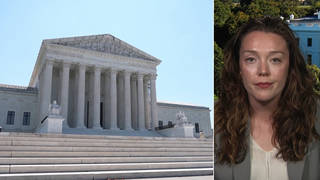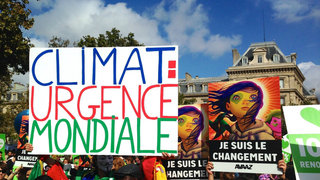
Click Here to see all Democracy Now! coverage of the Cancún Summit.
Click Here for full climate change coverage.
Maude Barlow is an author, activist, and the former senior adviser on water to the United Nations. She is the national chairperson for the Council of Canadians. She came to Cancún to speak with other civil society organizations about the relationship between water and climate change and the need for climate justice.
Democracy Now! caught up with Maude Barlow and asked her to talk about the COP16 talks.
MAUDE BARLOW: Basically, the negotiations have started. It’s very clear that several countries — probably the United States in the background, because it never supported Kyoto — but Canada, Japan and Russia officially, we have learned, are leading the charge to have — to kill Kyoto. Basically, the Kyoto Protocol had a part in it where the negotiations were to be started for a second round, and this would be binding commitments to emission reductions. All of the Global South countries, just about, are totally supportive of this; a lot of the Northern countries are not. But to my shame, my government has held the knife, that looks like it’s going to kill the Kyoto Protocol, and not only that, but deeply, deeply split the world community between countries of the Global South, who are the victims of climate change, and the countries of the North that are the perpetuators, perpetrators.
And I think it’s really important that they chose to do this at the beginning rather than the end, because they don’t want another feeling, tasteless, left in everyone’s mouth. While, as in Copenhagen, it was a failure, they want to get the controversial failure part of it now done. They’re going to take their lumps, and then they’re going to move into solutions.
And I predict the solutions are going to be all market-based, offsets, carbon trading, finance — minuscule financing, but all controlled by the World Bank. And this is a really dreadful process. It means that they can leave here feeling — or saying that they’ve come up with some kind of an agreement, but they don’t have to touch anything global. Economic globalization, unlimited growth, unregulated trade, the continued destruction of the earth, the continued rise in greenhouse gas emissions, the continued destruction of our water systems can all go on quite happily. And they can say they got together and they did something. It’s really appalling.
And the world needs to know about this. The world needs to know that killing Kyoto and replacing it with the Copenhagen declaration, which is non-binding and probably completely leaving the U.N. process behind and moving to the G20, which I think is their real agenda, is just a recipe for disaster, ecological and human disaster, and we have to say so.
JOHN HAMILTON: The week began with BP announcing it’s investing in the tar sands.
MAUDE BARLOW: Well, of course, probably the reason that Canada is leading the charge against Kyoto and anything binding is that we have this appalling, destructive oil sands or tar sands in northern Alberta, and this is a huge and growing area of greenhouse gas emissions. Right now they’ve taken down a boreal forest the size of Greece. They are holding water, poisoned water, in tanks and in holding dams. Some of them are almost as big as the Three Gorges Dam in China. It is the most destructive project on earth and getting worse. They have a planned fivefold increase, which means that we will now be the site of the greatest greenhouse gas emissions in the world, all so that we don’t have to, in North America, change any of our ways, our gas-guzzling, energy-intensive ways. That is why the Harper government is here. That is why it’s — of Canada — the Canadian government is taking a position against binding emissions. And they want the whole world to agree with it, because they want to continue to be able to destroy, you know, the entire northern part of Alberta.
People should know that the destruction that’s happening there is causing cancer clusters in children up in the Cree Nation. I mean, it is really an appalling thing happening, something you don’t think about in the so-called developed world or first world. And we’re part of the — our job here is to tell the story of what Canada is doing, backed by the Obama administration, because we’ve since learned that there’s been real work done between the Canadian government, the Canadian embassy in the United States, and the big companies like BP to convince the Obama administration to back off of any concerns that they have about dirty oil imports and so on. So this is really about continued bad, horrible practices and coming out of here looking good, like something has come out of this. But really it hasn’t, and people need to know about it. We stand very much in solidarity with the First Nations people of northern Alberta and the indigenous peoples of the world, frankly, whose lands and waters and soils and air are being raped by this process. People need to understand, up in Port Chipewyan, it’s called, in the Cree Nation in northern Alberta, which is downstream from the tar sands, they — you know, they can’t drink the water, they can’t hunt anymore, they can’t fish. I mean, none of the traditional ways that they live are possible anymore. I mean, I call it Canada’s Mordor. It’s, you know, from The Lord of the Rings. It’s the death of nature. But they’re just indigenous people, so who cares?
So part of the role that we, as a movement, have to take, of course, is to stand in solidarity, be there with them when they voice this very loud and passionate and strong opposition to these kind of mega projects, which are taking place everywhere in the world. If you look at Patagonia, if you look at the, you know, interior of India, it doesn’t matter where you go, there isn’t anywhere safe from the mining companies, the pulp and paper companies, the energy companies. There isn’t a place on earth they don’t want to go to destroy it. And this place that we’re here at this U.N. summit is the place to say no more of that. We have to protect Mother Nature. You know, we have to protect Mother Earth. And we want to promote the Cochabamba Accord, which came out of the April meeting in Cochabamba, Bolivia, which is a totally different world vision than the Copenhagen Accord that sidetracked the U.N. process last year in Copenhagen. I don’t think there will be a mention of it here. We are promoting and supporting a Universal Declaration on the Rights of Mother Earth, which we want one day to be a companion piece to the Universal Declaration on Human Rights. And we want it to be considered a form of human rights, that we cannot have our own human rights if the earth is dying. So we really have to have what Vandana Shiva calls a notion of earth democracy. All of that is in our language. It’s in the language of many of the countries from the Global South, and their negotiators are as clear as we are on it. It’s the countries, those mostly Anglo countries — you know, Canada, U.S., Australia, New Zealand, you know, and joined in this case, unhappily so, by Japan — leading a charge against protecting the earth. But I have faith that even if it doesn’t come out right here, the movement builds, and that’s what we’re doing here.











Media Options